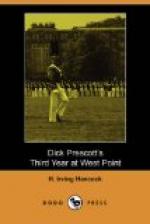Having thrown its rider, Satan cantered off to the far end of the riding hall, where he stood, snorting defiance.
Captain Albutt allowed Prescott’s head and shoulders to sink easily to the tan-bark.
“Are you badly hurt, Mr. Prescott?” inquired the officer.
“The small of my back is paining me just a little sir, from the wrench,” replied Prescott coolly. “If it hadn’t been for you, sir, my neck would have been broken.”
“I think it would,” replied the cavalry officer, smiling. “But this is one of the things I am here for. Do you feel as if you could rise, Mr. Prescott, with my help?”
“I’d like to try, sir.”
Dick did try, but watchful Captain Albutt soon let him down again.
“You may not be much hurt, Mr. Prescott, but I want one of the medical officers to take the responsibility for saying so. Just lie where you are until we get a medical officer here. Mr. Haynes, pass your lines to the man at your left and run to the telephone. Ask for a medical officer and two hospital corps men with a stretcher.”
The turnback leaped quickly to obey. This gave him the coveted chance to get away by himself, where he could secretly remove from his boot the little black pin that had been responsible for this excitement.
Surgeon and hospital men came on the run. The surgeon declined to make an examination there, but directed his men to lift the injured cadet to the stretcher and take him to the hospital.
In the meantime some enlisted men had caught and quieted Satan, leading him from the tanbark.
“That brute never will be used again, if I have my way,” muttered Captain Albutt, loudly enough to be heard by most of the cadets of the squad.
Then the drill proceeded as though nothing had happened.
“I fixed my man that time, and easily enough,” growled Haynes to himself. “He’s out of the service, from now on. He can nurse a weak back the rest of his days.”
When the drill was dismissed a party of three ladies, who had seen the whole scene from one of the iron balconies, came down to meet the cavalry officer.
“Your conduct was just splendid, captain, cried one of the women, her face glowing. But I feared you would be killed, or at least badly hurt, when you put yourself in the way of that somersaulting cadet. Why did you take such chances?”
“In the first place,” replied the cavalry officer quietly, “because it was simple duty. There was another reason. If I am hurt, in the line of duty, I have my retired pay, as an officer, to live on. But a cadet who is hurt so badly that he cannot remain in the service has to go home, perhaps hopelessly crippled for life—–and a cadet injured in the line of duty has no retired pay.”
“Why is that?” asked another of the ladies.
“I do not know, replied Captain Albutt simply, unless it is because Congress has always been too busy to think of the simple act of justice of providing proper retired pay for a cadet who is injured for life.”




